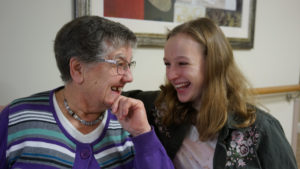 How do you put a value on a human being? It’s question highlighted by the debate in the assisted dying bill, which passed its first hurdle and has been voted through to become part of Government debate in the New Year. My Member of Parliament, Nick Thomas Symonds summed up many concerns when he said that he didn’t support the proposed legislation because of concern about the adequacy of safeguards that are put in place for any legislation of assisted dying. ‘I worry about ill, vulnerable people being and/or feeling pressured into making decisions, or, indeed, in pressure on themselves as they may feel they are becoming a burden to their families.’
How do you put a value on a human being? It’s question highlighted by the debate in the assisted dying bill, which passed its first hurdle and has been voted through to become part of Government debate in the New Year. My Member of Parliament, Nick Thomas Symonds summed up many concerns when he said that he didn’t support the proposed legislation because of concern about the adequacy of safeguards that are put in place for any legislation of assisted dying. ‘I worry about ill, vulnerable people being and/or feeling pressured into making decisions, or, indeed, in pressure on themselves as they may feel they are becoming a burden to their families.’
Professor June Andrews, OBE FRCN FCGI, is a Scottish psychiatric nurse who is an expert in dementia studies and care of the elderly. She was professor of dementia studies at the Dementia Services Development Centre at the University of Stirling. She is now Professor Emeritus. In an article in a national newspaper she said, ‘I know there are very many people who think we’re living longer than we should, and the evidence that they produce to justify that feeling is the fact that the majority of the state spend in anybody’s life is in their last couple of years, between hospital admissions, medical interventions and all the rest of it. There are some people who really believe that it’s wasted money, because the quality and length of life you get for that amount would be better spent somewhere else in a different way. But this is just a value judgment, that somebody’s life is not worth as much as another person’s, and whose is that to make?’
So how do you value a human life? I google the question and AI comes back with, ‘Every human being has intrinsic value and deserves to be treated with respect and dignity, regardless of their circumstances, beliefs, or background. This value is based on our shared humanity and our capacity for love, compassion, and connection.’
But in today’s culture a person is valued on what they do, rather than who they are. One result is that the fewer years you have to live, the less time you have to do, so the lower your value. Older people themselves can believe this to be true, which makes them feel useless and a burden on a younger, more productive society.
This isn’t how God sees it, of course. God intended old age to be a time of blessing, of developing a deeper relationship with Him, of reflecting His goodness and faithfulness. Physically, old age is a time of diminishment – who can walk as fast at 90 as they did at 19? But spiritually, it is meant to be a time of blessing and growth. In our Zoom Meeting next month, on 14th January, retired Pastor, and much loved bible expositor, Roger Hitchings will be looking at the special blessings God intends for old age.
In the meantime, how can we help older people realise their value? I could spend all day writing answers to that (and an article in the Spring issue of our Pilgrims’ Friend Society magazine addresses it, too), but for the moment see it encapsuled in the picture of the front cover of the programme of the Princess of Wales’ annual Christmas Carol service at Westminster Abbey. Designed by British artist Charlie Mackesy, author of The Boy, the Mole, the Fox and the Horse, the illustration showed a group of people with an arm around each other as they stroll toward Westminster Abbey in the snow. Underneath is the question: “How did I help?” and the answer: ‘You were by my side. Which was everything.’














